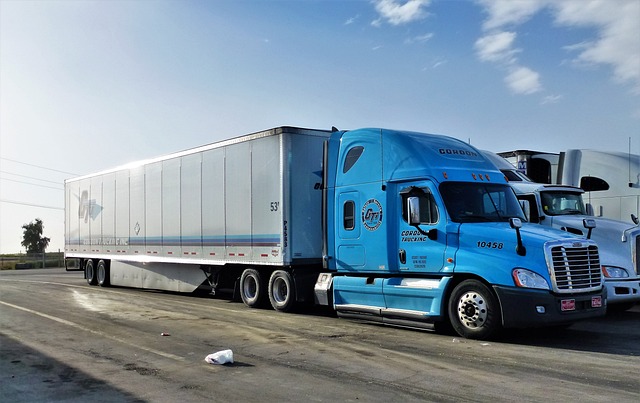During winter, ensuring a truck battery's performance remains optimal is essential due to the impact of cold temperatures on its efficiency. Low temperatures slow down chemical reactions within traditional lead-acid batteries, thickening the electrolyte and reducing cranking power. To counteract this, it's crucial to keep the battery fully charged to prevent sulfation, use insulation like a well-fitted cover to shield it from cold, and position it in a warm location, such as under the hood. Regular checks for corrosion on connections, terminals, and cables are necessary, especially since road salts can cause issues. Cleaning with baking soda paste and ensuring the battery is securely fastened can prevent power disruptions from vibrations or movements. Employing a smart charger with temperature compensation helps maintain an optimal charge level, while advanced batteries like AGM or EFB models offer greater resilience against freezing. Additionally, thermal management solutions and Battery Management Systems (BMS) can actively monitor battery temperatures and engage heating elements when needed. These innovations not only protect the battery from cold damage but also extend its lifespan and ensure reliable engine starts throughout the winter season.
When winter’s chill sets in, ensuring your truck battery remains robust is paramount. This article delves into three pivotal tips for safeguarding your truck’s battery against cold weather’s harsh effects. From insulation techniques to regular maintenance and strategic placement, learn how to optimize performance and maintain efficiency. Additionally, explore the role of alternating current in preserving battery life, plus cutting-edge technologies designed to enhance protection. Preventative measures and emergency kits are also essential for overcoming cold weather challenges effectively.
- Understanding the Impact of Cold Weather on Truck Batteries
- Tip 1: Insulating Your Truck Battery for Optimal Performance
- Tip 2: Regular Maintenance and Monitoring in Winter Conditions
- Tip 3: Strategic Battery Placement and Positioning to Counteract Cold Temperatures
- The Role of Alternating Current (AC) in Maintaining Truck Battery Efficiency
- Advanced Technologies for Enhanced Cold Weather Battery Protection
- Preventative Measures and Emergency Kits: Staying Ahead of Cold Weather Challenges
Understanding the Impact of Cold Weather on Truck Batteries

During cold weather conditions, a truck battery’s performance can be significantly affected, necessitating special care and attention to ensure optimal function. The chemical reactions within a lead-acid truck battery slow down as temperatures drop below freezing. This reduction in efficiency is due to the thickening of the electrolyte fluid, which slows down the flow of electrical current. As a result, the battery struggles to hold a charge, leading to reduced cranking power when you attempt to start your vehicle. The cold can cause internal battery resistance to increase, further diminishing the battery’s ability to deliver the necessary voltage for starting truck engines, especially in the morning when the engine is least warm.
To mitigate these issues, it’s crucial to maintain a fully charged state for the truck battery during winter months. Regularly charging the battery can help prevent sulfation, which occurs when the lead sulfate on the plates becomes too thick, further impacting the battery’s ability to hold a charge. Additionally, insulating the battery with a properly fitted cover can protect it from the harshest temperatures. Choosing a location for the battery where it won’t be exposed to extreme cold, such as under the hood or in the engine compartment where residual heat resides, is also beneficial. Regular maintenance and understanding the impact of cold weather on truck batteries are essential for ensuring that your vehicle starts reliably during the colder seasons.
Tip 1: Insulating Your Truck Battery for Optimal Performance

When temperatures plummet, your truck’s battery performance can be significantly impacted. To maintain optimal function during cold weather, it’s crucial to insulate your truck battery properly. A well-insulated battery prevents the chemical reactions inside from slowing down excessively in low temperatures, ensuring that your vehicle starts reliably even when it’s chilly outside. Using a specific battery blanket designed for your truck’s battery model can offer protection by maintaining a slightly higher temperature than the ambient environment. These blankets are typically made of thermally conductive materials that allow the battery to operate within its ideal temperature range, thus preventing a loss of power and reducing the strain on the battery during engine starts. It’s important to select a blanket that fits snugly around your truck’s battery and to ensure it’s installed correctly; this ensures even heat distribution and prevents condensation that could lead to corrosion or short-circuiting. By taking these precautions, you can safeguard your truck battery against the cold and keep it performing at its best all winter long. Proper insulation not only extends the lifespan of your truck battery but also offers peace of mind, knowing that your vehicle will start whenever needed, regardless of the weather conditions.
Tip 2: Regular Maintenance and Monitoring in Winter Conditions

When the mercury dips, ensuring your truck’s battery remains healthy is paramount for cold weather operation. Regular maintenance and vigilant monitoring are key to safeguarding your truck battery against the harsh realities of winter conditions. Firstly, it’s crucial to inspect the battery’s connections, terminals, and cables regularly during this season. Corrosion can form on terminals due to road salt and other chemicals used to treat roads in cold climates, which can impede electrical flow and reduce the battery’s efficiency. Cleaning the terminals with a baking soda paste can help prevent this issue. Additionally, ensure that the battery is securely mounted and that all connections are tight to prevent any disruption in power caused by vibration or movement.
Monitoring the charge level of your truck battery is also essential during the winter months. Cold weather can significantly reduce a lead-acid battery’s capacity, meaning it may not hold as much of a charge at freezing temperatures compared to warmer conditions. A fully charged battery retains more power in cold weather, so make it a practice to keep your truck battery charged. Using a smart charger with a temperature compensation feature can help maintain an optimal charge level, ensuring your truck starts reliably even on the coldest mornings. Regularly check the battery’s voltage and state of charge, and take proactive steps to recharge if necessary. With these maintenance practices in place, you can mitigate the impact of winter on your truck battery and maintain its performance throughout the season.
Tip 3: Strategic Battery Placement and Positioning to Counteract Cold Temperatures

When operating in cold weather conditions, strategic placement and positioning of your truck battery can significantly impact its performance and longevity. Cold temperatures can lead to reduced chemical activity within the battery, causing a decrease in battery capacity and an increase in the likelihood of a sulfate bloom, which can further impair performance. To counteract these effects, it’s crucial to consider the battery’s position within the truck’s compartments. Positioning the battery in a warm part of the vehicle, such as near the engine or cabin where heat is generated, can help maintain optimal operating temperatures. Ensure that the battery is securely mounted and insulated against direct exposure to cold drafts from windows or doors. Additionally, avoid placing heavy objects on top of the battery, as this can generate excessive heat that might lead to overcharging when the engine is running. By carefully considering the placement and positioning of your truck battery, you can mitigate the harsh effects of cold weather, thereby enhancing the reliability of your vehicle’s electrical systems during the winter months. Truck owners should regularly monitor their batteries in colder climates and make adjustments to their placement as necessary to maintain optimal performance and extend battery life.
The Role of Alternating Current (AC) in Maintaining Truck Battery Efficiency

In cold weather conditions, maintaining truck battery efficiency is paramount for ensuring vehicle operations run smoothly. The performance of a truck battery can be significantly impacted by the drop in temperature, as chemical reactions within the battery slow down, reducing its ability to hold a charge. To mitigate this effect, the use of Alternating Current (AC) generator systems plays an essential role. These systems are designed to work efficiently even when temperatures plummet, ensuring that the battery is not overly taxed by providing the necessary electrical currents in a form that’s easier on the battery’s capacity. By supplying power as needed without relying solely on the truck battery for energy, AC generators help prevent the battery from becoming depleted and stranded in the harsh cold. Regular maintenance, including checking the battery’s charge levels and ensuring connections are clean and corrosion-free, complements the use of AC systems to maintain optimal truck battery efficiency throughout the winter months.
Furthermore, integrating thermal management solutions can further enhance the performance of truck batteries in cold weather. These solutions help regulate the temperature of the battery, allowing for consistent and reliable power output even when external temperatures are at their lowest. It’s important to regularly inspect and maintain the battery’s insulation and to select the right type of battery for your truck, considering factors such as capacity, cranking amps, and cold cranking amps (CCA). By combining the benefits of AC generator systems with proactive thermal management and diligent maintenance routines, you can ensure that your truck’s battery remains a reliable power source, regardless of the winter weather.
Advanced Technologies for Enhanced Cold Weather Battery Protection

To safeguard truck batteries against the harsh realities of cold weather, advanced technologies have been developed and implemented in recent years. These innovations focus on maintaining optimal battery performance during freezing temperatures when traditional batteries can struggle. One such technology involves the use of absorbent glass mat (AGM) or enhanced flooded (EFB) batteries, which are designed to withstand colder conditions compared to conventional lead-acid batteries. AGM and EFB models feature a special electrolyte that reduces the risk of freezing and ensures consistent energy flow even in sub-zero climates.
Another critical advancement is battery temperature monitoring systems. These systems can detect when the ambient temperature falls below optimal ranges and automatically trigger auxiliary heating elements to gently warm the battery, thereby preventing it from becoming too cold. This preemptive approach to thermal management ensures that the battery’s chemical reactions remain efficient, prolonging its lifespan and enhancing its reliability in challenging environments. Furthermore, some modern trucks are equipped with smart batteries that have built-in battery management systems (BMS) capable of self-diagnosing and reporting on their condition, providing valuable data to prevent potential issues related to cold exposure. These technologies not only protect the truck battery from the adverse effects of cold weather but also contribute to improved safety and efficiency in transportation operations.
Preventative Measures and Emergency Kits: Staying Ahead of Cold Weather Challenges

When winter’s chill sets in, safeguarding your truck battery becomes paramount. The cold can be a relentless adversary for these critical components. By adhering to the top three tips for cold weather truck battery care—insulating, maintaining, and strategically positioning your battery—you can significantly enhance its performance and longevity. Insulation is a game-changer, as it prevents excess energy loss, while regular monitoring ensures you stay abreast of its condition. Strategic placement can mitigate the impact of frigid temperatures. Additionally, understanding the role of alternating current in maintaining battery efficiency is crucial for optimizing power output. Advanced technologies and preventative measures, including emergency kits, are also key to staying ahead of the challenges cold weather presents. Taking these steps not only extends the life of your truck battery but also ensures reliability when you need it most.


